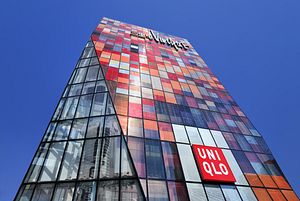Japan’s largest clothing retailer, Uniqlo, said on Tuesday it will start gradually raising its prices in July, according to its parent company Fast Retailing’s spokesman, Keiji Furukawa. This news was accompanied by data suggesting that Japan’s economy has fared better than expected following the consumer tax increase to 8 percent in April. Other major Japanese retailers are also seeing large profits, as the perennial problems of deflation and weak demand appear to be diminishing.
Uniqlo has released information that its price increase will be across the board, and will be implemented in stages through July and August to apply to its autumn and winter collections, according to the Japan News. While Prime Minister Shinzo Abe’s economic reforms were intended to cause price increases due to increased demand, Uniqlo’s reasons have more to do with protecting its profit margins. The weakening of the yen has caused the cost of the company’s textile inputs to rise, which in turn led to the need to increase prices, according to company sources who spoke with the AFP.
However, the company has already passed April’s tax increase onto consumers, so the new price increase suggests that Uniqlo does not expect deflation to continue to be a problem, at least in the short-term. Reuters data shows that core consumer prices, excluding the impact from the sales tax, rose 1.5 percent in April from 1.3 percent in March. More than a quarter of corporations surveyed in May reported that “year-on-year sales had actually risen in the weeks following the tax hike, while over 40 percent said sales had held steady.”
Meanwhile, the Japanese retail behemoth Seven & i Holdings Co (owner of the 7/11 convenience store chain) recorded record profits between March and May. The Nikkei Asian Review reported that the company’s store sales increased 6.8 percent in March from the previous year. While growth declined to 0.8 percent in April, it rebounded to 3.5 percent in May. Another major Japanese retailer, Ito-Yokado, said it is experiencing operating profit growth, and expects a 5 percent operating profit increase in the full year through February 2015, which would mean record profits for the fourth year in a row for the company.
While consumer demand may not be the main driving force behind Japan’s recent inflationary trend, Japanese retailers appear to be optimistic that demand will continue to grow over the coming months. However, upcoming price increases will test this theory. As Credit Suisse analyst Taketo Yamate said in the above Reuters article, “Now that the price hike has made news, there’s a new concern over how much this would affect sales and traffic at stores. If revenue falls, fixed costs would rise and profit margins will worsen.”

































